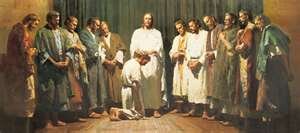Biblical Apostles
The New Testament clearly outlines the gift of the apostle in Ephesians 4:11-12: “And He Himself gave some to be apostles, some prophets, some evangelists, and some pastors and teachers, for the equipping of the saints for the work of ministry, for the edifying of the body of Christ.” Also mentioned in Ephesians 2:20 and 1 Corinthians 12:28. The Apostle Paul and Christ’s apostles spoke of the gift as essential for the healthy function of the Church and training of the Saints.
The name “apostle” is a New Testament word the Apostle Paul described as a person who serves in the office that Jesus established at His ascension: “And He Himself gave some to be apostles, some prophets, some evangelists, and some pastors and teachers, for the equipping of the saints for the work of ministry, for the edifying of the body of Christ” (Eph. 4:11-12.).
The twelve Apostles of the Lamb are unique in history as Jesus indicated in Luke 22:28-30, where Jesus said, “But you are those who have continued with Me in My trials. And I bestow upon you a kingdom, just as My Father bestowed one upon Me, that you may eat and drink at My table in My kingdom and sit on thrones judging the twelve tribes of Israel.” There are no apostles in any other time in history that can claim equality with the original twelves.
The Kingdom of God
The Kingdom of God is the rule of God on earth as it is in heaven. That rule begins in the hearts of His children and extends through the church and expands as influence into society as His children serve others with wisdom and compassion, permeating every sphere of culture in which they live.
Contemporary Apostles
An apostle is defined by ICAL as, “A Christian leader gifted, taught, commissioned, and sent by God with the authority to establish foundational government within an assigned sphere by hearing what the Holy Spirit is saying and one who sets things in order accordingly for the growth and maturity.”
ICAL recognizes that apostolic Leaders operate in several different ways. We recognize “Vertical Apostolic Leaders” which including those apostles leading churches aligned governmentally with functional authority. Paul is a Biblical example of a Vertical Apostle.
We also recognize that other apostles are “Horizontal Apostolic Leaders.” These are leaders who are more egalitarian in their approach and are especially gifted in gathering and mobilizing leaders around certain projects, theological positions and creating professional societies. James is a Biblical example of a Horizontal Apostle.
Within the scope of Vertical and Horizontal Apostolic Leaders, ICAL recognizes that some leaders are called by God to use their gifts in the marketplace. They may work in both the church and the marketplace or exclusively in one or the other. ICAL has created a cohort of marketplace leaders called “Lead Global 360.” Read More
Apostolic Leaders
When the church started on the Day of Pentecost in Acts 2, the only Five-fold Equipping Gift present was the Gift of Apostle. Therefore, every other gift mentioned in Eph. 4:11-12 (prophet, evangelist, pastor & teacher) developed out of the apostolic gift. In other words, it made each of those other gifts apostolic in perspective and functioned – apostolic prophets, apostolic evangelists, apostolic pastors, and apostolic teachers.
Traditionally, apostles in the ancient world were those specifically sent by a recognized authority on a particular mission to represent said authority in executing an explicit command. The apostles of the Bible represented Jesus as they travelled into the various regions and cities of the world. There, they extend the Kingdom rule of God into every sphere of society. This mission was accomplished by establishing local churches where members were equipped to influence every sphere in society.
Therefore, ICAL defines an Apostolic Leader as “one who aligns with an apostolic perspective and mission as described above and embraces the present functioning of all Five-fold Equipping Gifts mentioned in Ephesians 4:11-12.”
Here are some of the reasons why ICAL prefers the term, “Apostolic Leaders” over the term, “Apostle:”
The word “Apostle” is a noun (a part of speech used to name a person or thing).
The word “Apostolic” is an adjective (a part of speech that modifies a noun; qualifying or describing the word).
The word “Leaders” (a noun) refers to a plurality of those who function as a leader.
The distinguishing evidence that one is truly an apostolic leader includes:
They are the primary point person of a network, a movement, a major thought leader, or influencer with a substantial following.
They are master builders and overseers of God-designated spheres of influence.
They are recognized and honored by their followers and their peers.
Many with the gift of apostle choose to call themselves “Bishop, Pastor, Prophet, Doctor,” or any other titles including “Apostle.” ICAL believes fruit qualifies a person more than their title. Jesus said, “You shall know them by their fruit” (Matt. 7:16,20).
Fruit is evidenced in a person’s life by:
Their commitment to Christ.
Character by which they live.
Humility in which they serve.
How they raise up spiritual sons and daughters.
What they have actually built, established, and accomplished.
Therefore, ICAL is a missional movement of true Apostolic Leaders from all walks of society who influence all spheres of society.
2023 ICAL






